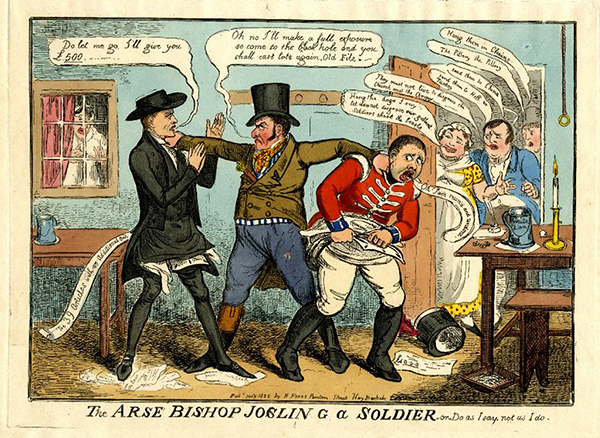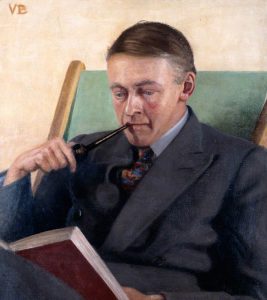On this Day
Published in Issue 5 (September/October 2016), News, Volume 24SEPTEMBER

Above: Robert Cruikshank’s vicious caricature of Revd Percy Jocelyn, ‘the Arse Bishop’ of Clogher.
Percy Jocelyn, disgraced bishop of Clogher (1820–2), died. Thanks to his family connections—his father was the first earl of Rodin—Jocelyn rose rapidly in the Church of Ireland despite a total disinterest in pastoral responsibilities such as taking services and preaching. His fellow clerics described him as the ‘most idle of all reverend idlers’. His first major public scandal occurred in 1811, when one James Byrne, a coachman, accused him of propositioning him for sexual favours. In response he successfully sued Byrne for malicious libel on the grounds that homosexuality had not yet reached the shores of Ireland from the ‘godless’ Continent and was praised from the bench for his ‘virtue, piety and devotion’. Byrne was stripped, tied to a cart, dragged through the streets of Dublin and thrown in prison for two years. Then in the summer of 1822, when rumour had it that he was selling off the furnishings of Clogher Palace, he made national headlines when discovered with his trousers down in the company of a young grenadier guardsman in the back parlour of a London public house, an incident that spawned a host of bawdy ballads, cartoons and limericks. Charged with a misdemeanour—sodomy was a capital offence but no sexual act had actually been engaged in prior to his arrest—he was released on bail and fled to France, and was deposed as bishop later that year. James Byrne was vindicated and a sum of £300 was raised for him by public subscription. The former bishop ended his days in Scotland, working as a butler under an assumed name.
02/1666
The Great Fire of London, which destroyed 400 acres of the city but cost just nine lives, began in a bakehouse in Pudding Lane.
05/1926
Forty-eight lives were lost when fire broke out in a cinema in Drumcolliher, Co. Limerick, during a showing of The Ten Commandments.
07/1966
Hendrik Verwoerd, prime minister of South Africa and the architect of apartheid, was fatally stabbed by Dimitri Tsafendas during a parliamentary meeting.
08/1966
The first episode of Star Trek, ‘The Man Trap’, was broadcast, in which Captain Kirk faced an alien desperate to suck the salt out of human bodies.
09/1916
Tom Kettle (36), poet and nationalist, was mortally wounded whilst leading his men in an attack at Ginchy during the Battle of the Somme.
10/1966
The Fianna Fáil minister for education, Donogh O’Malley, announced that free secondary education would be available throughout the state from the following year.
13/1916
Roald Dahl, novelist, poet and short-story writer, renowned for his darkly comic children’s books, born in Wales to Norwegian parents.
15/1866
John Blake Dillon (50), lawyer, Young Irelander and co-founder of The Nation (1842), died from cholera.
21/1866
H.G. (Herbert George) Wells, the father of science fiction and four times Nobel Prize for Literature nominee, born in Kent.
28/1966
The ‘Tricolour riots’, the worst disturbances in Belfast for over 30 years, began when the RUC, under the terms of the notorious Flags and Emblems Display Act (1954), forcibly removed a tricolour from a window at the election headquarters in Divis Street of Liam McMillan, Republican (Sinn Féin) candidate in the impending Westminster election.
The Ulster Orchestra was founded by the Arts Council of Northern Ireland.
28/2001
Martin O’Hagan, a journalist with the Sunday World newspaper, was shot dead by the LVF/ Red Hand Defenders near his home in Lurgan, Co. Armagh.
OCTOBER

Above: Portrait of Sir Arnold Bax by his sister-in-law Vera, née Rawnsley. (Royal Academy of Music)
Sir Arnold Bax (69), composer, poet and author, died. In 1902, as a result of reading Yeats’s ‘The Wanderings of Oisin’, Bax, then a nineteen-year-old music student, fell in love with Ireland and all things Irish. He began to make regular trips, mainly staying in the remote Glencolmcille region of south-west Donegal, where he learned Irish, wrote poetry and short stories with ‘Celtic’ themes under the pseudonym Dermot O’Byrne, and began to write music inspired by Ireland’s mythology and seascapes. From 1911 to 1914 he lived in Dublin and became part of the literary circle based at the home of George Russell (AE), where he became friends with notables such as James Stephens, the O’Rahilly, Thomas MacDonagh, Countess Markievicz and Pádraic and Mary Colum. One evening at the Colums’ house he was introduced to Patrick Pearse. It was their only meeting but it had a huge effect on him—‘I could not forget the impression that strange death-aspiring dreamer made upon me, and when, on Easter Tuesday 1916 I read of that wild scatter-brained, but burningly idealistic adventure in Dublin the day before, I murmured to myself, “I know that Pearse is in this”.’ That summer he composed In Memoriam, for orchestra, subtitled ‘I gcuimhne ar bPádraig Mac Piarais’ [In memory of Patrick Pearse], the first of several works commemorating Pearse and the Rising. Knighted in 1937 and appointed Master of the King’s Music (music’s equivalent of Poet Laureate) in 1941, Bax, in an interview shortly before his death, declared, ‘I came very near to feeling myself to be a naturalised Eireanagh’. He died suddenly in Cork after a trip to the Old Head of Kinsale and was buried locally, in St Finbar’s cemetery.
03/1566
Richard Boyle, earl of Cork, entrepreneur, politician and leading figure in the defence of the Protestant interest in Munster after the outbreak of the 1641 Rebellion, born in Canterbury.
09/1966
David Cameron, Conservative MP for Witney since 2001 and prime minister of the United Kingdom (2010–16), born in Marylebone, London, the son of a stockbroker.
12/1866
Ramsey McDonald, who led Britain’s first Labour Party governments (1924, 1929–31) and a National Government (1931–5), born in Morayshire, Scotland, the son of a farm labourer.
13/2006
The St Andrews Agreement between the British and Irish governments and Northern Ireland’s political parties in relation to devolution of power was signed.
14/1066
The Battle of Hastings, in which the Saxon King Harold Godwineson was defeated by an invasion force led by William, duke of Normandy, latterly ‘William the Conqueror’.
18/1976
‘It was amazing when the president [Cearbhall Ó Dalaigh] sent the Emergency Powers Bill to the Supreme Court … In my opinion he is a thundering disgrace’—Patrick Donegan, minister for defence, in a speech at Columb Barracks, Mullingar, Co. Westmeath.
19/1216
King John (49), generally regarded as the worst king in English history, died from dysentery.
21/1966
One hundred and forty-four died—116 children and 28 adults—when a landslide of coal slag demolished a school and houses in the village of Aberfan, Merthyr Valley, South Wales.
22/1966
The British spy George Blake was sprung from Wormwood Scrubs prison by Limerickman Seán Burke.
26/1916
François Mitterand, leader of the French Socialist Party and president of France (1981–95), born in Jarnac, Charente, the son of devout Catholic parents.
30/1816
‘The burning of Wild Goose Lodge’, an agrarian outrage on the County Louth/Meath border, in which five residents and three servants died when a property was set on fire by a 100-strong group of men.
















